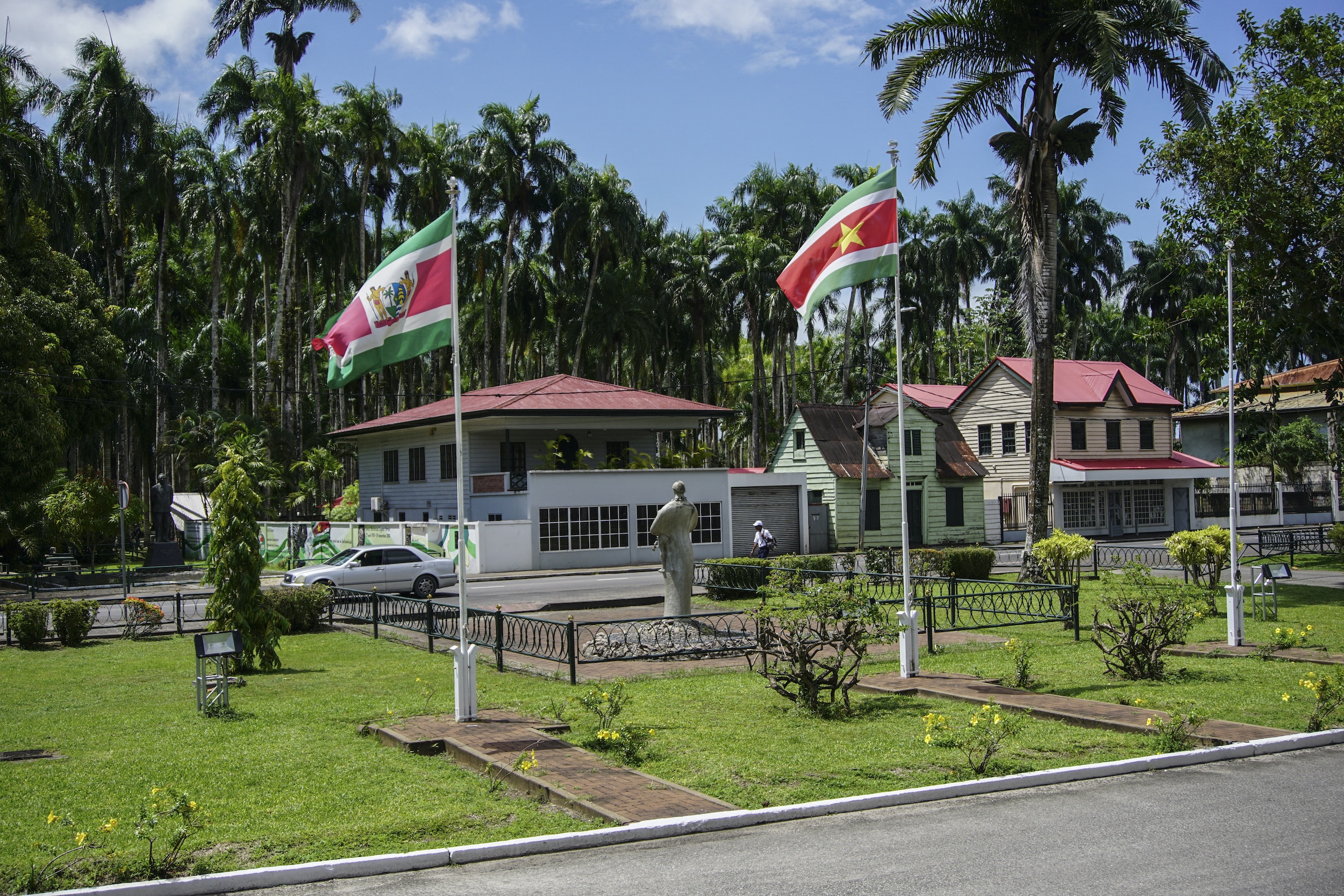
General view of the Cabinet office of the president of Suriname in Paramaribo taken on Sept. 13, 2022. Suriname votes in parliamentary elections on May 25, 2025. This will determine what kind of government will oversee plans to use giant oil deposits to transform the fortunes of one of South America’s poorest nations. (Photo by Patrick FORT / AFP)
PARAMARIBO, Suriname — Suriname, South America’s smallest country, is preparing for an inflow of cash from a huge offshore oil find. The president insists that the population will receive a direct share of the wealth.
The Dutch-speaking nation of about 600,000 people expects to rake in about $10 billion in the next decade or two. Crude extraction is set to begin in 2028.
Projected output is 220,000 barrels per day (bpd) — up from about 5,000 to 6,000. This is a country where one in five people live in poverty.
“From 2028, we’ll be an oil-producing country,” President Chan Santokhi told AFP ahead of elections Sunday. Voters will elect lawmakers who will choose the next president.
READ: ‘Black gold’ for Guyana and Suriname, a blessing or curse?
Santokhi is one of several candidates in the running to steer the former Dutch colony. It is wedged between Brazil, Guyana and French Guiana.
“It will be a huge amount of income for the country,” he said. “We are now able… to do more for our people so that everyone can be part of the growth of the nation.”
The oil money is invested in agriculture, tourism, health, education and green energy. Aside from that, some of the oil money is paid directly to Surinamese citizens under a program Santokhi has dubbed “Royalties for Everyone” — RVI for its Dutch acronym.
Direct oil money payout to eligible citizens
“It’s their share,” he said.
Victorine Moti, a finance ministry official responsible for the fund, told AFP: “The whole population of Suriname is eligible for this program. Everybody who was born before the 1st of January 2025 and had the Surinamese nationality.”
“In figures, it’s 572,000 people.”
All eligible citizens can register to receive a one-off payment equivalent to $750. The amount will be paid into an account with an interest yield of 7 percent per year.
“With the certificate, they can go to the bank and they have two options: they can withdraw the money or they can choose to save. Hopefully, they will try to save and not cash out immediately,” said Moti.
The first beneficiaries are the elderly and disabled, paid with funds advanced by banks.
Next in line will be people 60 and older. And then next — once the revenues start flowing in 2028 — is the biggest group of people, aged 18-59.
People who save their money for 10 years will receive a bonus of $150 on top of interest earned.
‘Enjoy my money’
Naslem Doelsan, 80, has already received her certificate. She told AFP she will cash out “to buy good food and some household stuff.”
“Why do I need… money in the bank? I’m already old and I want to enjoy my money,” she said.
Fellow retiree Jai Abas, 91, told AFP he would keep the money in the bank for now, and maybe give his granddaughter, who lives in the Netherlands, some “pocket money” when she visits.
“What would I do with money? I am old. I can’t go anywhere,” said Abas, adding his only vice is cigarettes.
Anuschka Tolud, a 38-year-old in a wheelchair, said she would save her payout in the hopes it can one day augment her $113 monthly welfare payout.
Santokhi had previously spoken about avoiding the so-called “oil curse,” also known as “Dutch disease.” This had befallen other resource-rich countries, such as Venezuela, Angola and Algeria. They were unable to turn oil wealth into economic success.
Norway became an exception by creating a sovereign wealth fund.
Suriname, the president said, would take a “unique” approach, well aware that its crude resources will last only about 40 years.
“We have income from the profit of the oil, we will have income from our fiscal revenues and we will have income from the royalties,” he said.
Property of the nation
In 2024, French multinational TotalEnergies committed to investing $10.5 billion in the offshore oil field of GranMorgu in the Atlantic Ocean.
An article in the Surinamese Constitution states that “natural riches and resources are property of the nation and shall be used to promote economic, social and cultural development.”
But some worry that the benefits may not find their way to all citizens, especially those who live in rural areas, Indigenous communities and Maroons — descendants of African slaves.
“I myself am curious as to how funds and bureaucracy will be accessed by Indigenous and Maroon communities,” Giovanna Montenegro told AFP. She is director of the Latin American and Caribbean Studies Program at Binghamton University in New York State.